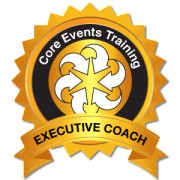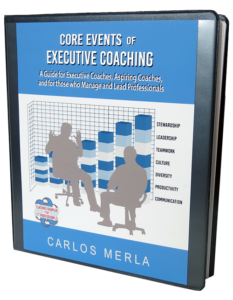Become a Core Events Accredited Executive Coach
There are two ways to become an Accredited Executive Coach!

1. Core Events offers our independent accreditation. This Level 300 training program is designed to develop your skills in consulting, mentoring, and coaching professionals who are working through their professional development and business challenges. The program is focused for individuals who are currently in a role of training or coaching others, or for professionals seeking to make a career in executive coaching.
Our accreditation process consist of 25 hours of remote or direct training and will cover the core elements needed to Coach Professionals.
2. Core Events and the Merla Leadership Group are approved collaborators with the Center of Executive Coaching (CEC), an Accredited Coach Training Program (ACTP) from the International Coach Federation (ICF). After completion of this program, you will receive the credential of a Certified Executive Coach through the Center of Executive Coaching (CEC), You will also have the opportunity for fast-tracking your application to the ICF for their credential of Associate Certified Coach (ACC) by going through an additional 10 hours of direct mentor coaching to complete the ACTP.
Accreditation Details
Contact us for more information and rate details.
Cost and Options for Receiving Certification
Contact us for more information and rate details.
Why you Should be an Executive Coach?
If you have the passion to teach others what you have been trained on and have the ability to mentor others on what you know then becoming an Executive Coach is right for you.
If you are already conditioned to help others who struggle with their careers or constantly guide those who need assistance with organizational challenges then Coaching is the right fit.
If you are interested in expanding your leadership knowledge in developing your organization the becoming trained as an Executive Coach will help you grow as well as help others grow.
If you have the interest, passion and commitment to start a new career in helping managers, leaders, executives at all levels with the on-going challenges of running their business and their organization then becoming an Executive Coach is the right path for you.
Here are some facts taken from the International Coaching Federation (ICF) that describes the tremendous growth the Coaching industry currently has:
Coaching has grown significantly for many reasons, among them:
- Rapid changes are taking place in the external business environment.
- Downsizing, restructuring, mergers and other organizational changes have radically altered the “traditional employment contract.” Companies can no longer achieve results using traditional management approaches.
- With the growing shortage of talented employees in certain industries, companies must commit to investing in individuals’ development.
- The disparity between what managers were trained to do and what their jobs now require of them is widening due to increasing demands for competitive results.
- People are wrestling with job insecurity and increased workplace pressures to perform at higher levels than ever before.
- Companies must develop inclusive, collaborative work environments to achieve strategic business goals and to maintain high levels of customer satisfaction.
- Individuals who have experienced the excellent results of coaching are talking to more people about it.
- People today are more open to the idea of being in charge of their own lives. Coaching helps them do just that.
In short, coaching helps individuals and companies focus on what matters most in life and business, and so the industry continues to grow.
Contact us for more information and rate details.
International Coaching Federation Code of Ethics
At Center for Professional Accreditation you will find we follow the ICF Code of Coaching Ethics listed below:
Part One: Definition of Coaching
• Coaching: Coaching is partnering with clients in a thought-provoking and creative process that inspires them to maximize their personal and professional potential.
• A professional coaching relationship: A professional coaching relationship exists when coaching includes a business agreement or contract that defines the responsibilities of each party.
• An ICF Professional Coach: An ICF Professional Coach also agrees to practice the ICF Professional Core Competencies and pledges accountability to the ICF Code of Ethics.
In order to clarify roles in the coaching relationship, it is often necessary to distinguish between the client and the sponsor. In most cases, the client and sponsor are the same person and therefore jointly referred to as the client. For purposes of identification, however, the International Coach Federation defines these roles as follows:
• Client: The “client” is the person(s) being coached.
• Sponsor: The “sponsor” is the entity (including its representatives) paying for and/or arranging for coaching services to be provided.
In all cases, coaching engagement contracts or agreements should clearly establish the rights, roles, and responsibilities for both the client and sponsor if they are not the same persons.
Part Two: The ICF Standards of Ethical Conduct
Preamble: ICF Professional Coaches aspire to conduct themselves in a manner that reflects positively upon the coaching profession; are respectful of different approaches to coaching; and recognize that they are also bound by applicable laws and regulations.
Section 1: Professional Conduct At Large
As a coach:
1) I will not knowingly make any public statement that is untrue or misleading about what I offer as a coach, or make false claims in any written documents relating to the coaching profession or my credentials or the ICF.
2) I will accurately identify my coaching qualifications, expertise, experience, certifications and ICF Credentials.
3) I will recognize and honor the efforts and contributions of others and not misrepresent them as my own. I understand that violating this standard may leave me subject to legal remedy by a third party.
4) I will, at all times, strive to recognize personal issues that may impair, conflict, or interfere with my coaching performance or my professional coaching relationships. Whenever the facts and circumstances necessitate, I will promptly seek professional assistance and determine the action to be taken, including whether it is appropriate to suspend or terminate my coaching relationship(s).
5) I will conduct myself in accordance with the ICF Code of Ethics in all coach training, coach mentoring, and coach supervisory activities.
6) I will conduct and report research with competence, honesty, and within recognized scientific standards and applicable subject guidelines. My research will be carried out with the necessary consent and approval of those involved, and with an approach that will protect participants from any potential harm. All research efforts will be performed in a manner that complies with all the applicable laws of the country in which the research is conducted.
7) I will maintain, store, and dispose of any records created during my coaching business in a manner that promotes confidentiality, security, and privacy, and complies with any applicable laws and agreements
8) I will use ICF member contact information (e-mail addresses, telephone numbers, etc.) only in the manner and to the extent authorized by the ICF.
Section 2: Conflicts of Interest
As a coach:
9) I will seek to avoid conflicts of interest and potential conflicts of interest and openly disclose any such conflicts. I will offer to remove myself when such a conflict arises.
10) I will disclose to my client and his or her sponsor all anticipated compensation from third parties that I may pay or receive for referrals of that client.
11) I will only barter for services, goods or other non-monetary remuneration when it will not impair the coaching relationship.
12) I will not knowingly take any personal, professional, or monetary advantage or benefit of the coach-client relationship, except by a form of compensation as agreed in the agreement or contract.
Section 3: Professional Conduct with Clients
As a coach:
13) I will not knowingly mislead or make false claims about what my client or sponsor will receive from the coaching process or from me as the coach.
14) I will not give my prospective clients or sponsors information or advice I know or believe to be misleading or false.
15) I will have clear agreements or contracts with my clients and sponsor(s). I will honor all agreements or contracts made in the context of professional coaching relationships.
16) I will carefully explain and strive to ensure that, prior to or at the initial meeting, my coaching client and sponsor(s) understand the nature of coaching, the nature and limits of confidentiality, financial arrangements, and any other terms of the coaching agreement or contract.
17) I will be responsible for setting clear, appropriate, and culturally sensitive boundaries that govern any physical contact I may have with my clients or sponsors.
18) I will not become sexually intimate with any of my current clients or sponsors.
19) I will respect the client’s right to terminate the coaching relationship at any point during the process, subject to the provisions of the agreement or contract. I will be alert to indications that the client is no longer benefiting from our coaching relationship.
20) I will encourage the client or sponsor to make a change if I believe the client or sponsor would be better served by another coach or by another resource.
21) I will suggest my client seek the services of other professionals when deemed necessary or appropriate.
Section 4: Confidentiality/Privacy
As a coach:
22) I will maintain the strictest levels of confidentiality with all client and sponsor information. I will have a clear agreement or contract before releasing information to another person, unless required by law.
23) I will have a clear agreement upon how coaching information will be exchanged among coach, client, and sponsor.
24) When acting as a trainer of student coaches, I will clarify confidentiality policies with the students.
25) I will have associated coaches and other persons whom I manage in service of my clients and their sponsors in a paid or volunteer capacity make clear agreements or contracts to adhere to the ICF Code of Ethics Part 2, Section 4: Confidentiality/Privacy standards and the entire ICF Code of Ethics to the extent applicable.
Part Three: The ICF Pledge of Ethics
As an ICF Professional Coach, I acknowledge and agree to honor my ethical and legal obligations to my coaching clients and sponsors, colleagues, and to the public at large. I pledge to comply with the ICF Code of Ethics, and to practice these standards with those whom I coach.
If I breach this Pledge of Ethics or any part of the ICF Code of Ethics, I agree that the ICF in its sole discretion may hold me accountable for so doing. I further agree that my accountability to the ICF for any breach may include sanctions, such as loss of my ICF membership and/or my ICF Credentials.
Approved by the Ethics and Standards Committee on October 30, 2008.
Approved by the ICF Board of Directors on December 18, 2008.
Contact us for more information and rate details.
*Included in the Executive Coaching program is a recent released executive coaching training book by Carlos Merla, Core events of Executive Coaching, A guide for Executive Coaches, Aspiring Coaches and for those who Manage and Lead Professionals. A dedicated chapter for I.T. Professionals is featured in the book. This book is only available to those that participate in the accredited Executive Coaching program and not available for purchase.


